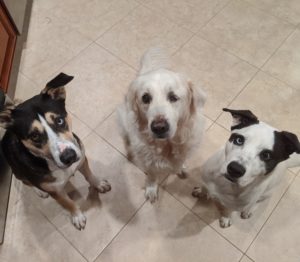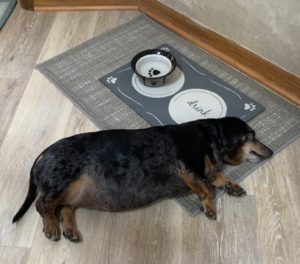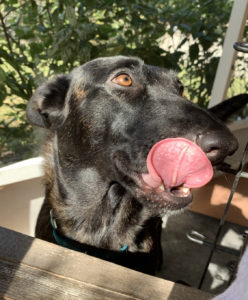Laboratory Tests for Dogs on Home-Cooked Diets
Taking Some of the Worry Out of Home-Cooking
If you cook for your dog or think you would like to, you are likely concerned about the responsibility to provide the necessary and balanced nutrients your dog needs.
“I help my clients provide wholesome real food for their dogs every day. It is the majority of my veterinary practice,” says Doc Truli.
You need a checklist of resources to assure wholesome balanced food for your dog.
Checklist to Home Cook for Your Dog
- Veterinary help- you need a veterinarian who can design computer balanced recipes for you or is willing to consult with a veterinarian who is a veterinary nutrition specialist.
- You need balanced recipes to make a meal plan for your dog
- You need consistent sources of quality ingredients
- You need to be able to boil an egg, measure ingredients, and do a little bit of cooking
Frequently Asked Questions About Home Cooking for your Dog
Q: Why do I need a strictly balanced recipe? It seems pickier than how I cook for my human family.
A: If you want the best health for your dog, you need to balance the recipe. Dogs do not have 3 months for every 1 month of chronic illness to recover. Their shorter lifespan gives us less time to fix mistakes. Better to avoid nutritional mistakes.
Q: Is it hard? Do I have to cook every day?
A: No and no. Ideally, a meal plan should have recipes that can be cooked in small batches and frozen in meal-size packages to be heated later. The meal plan should also have some balanced “quick-cook” recipes. Doc Truli often makes a balanced tofu-egg scramble recipe for clients to have a quick meal option when time is short.
Q: How can I test for nutritional completeness in my dog’s diet?
A: the practical answer is: you cannot. Technically, you can, but it costs many thousands of dollars to analyze one meal. You can have a recipe checked for balance by a veterinary nutritionist. However, experience tells us, your recipe is likely to have such big flaws in it, it is less expensive and quicker to just have new recipes formulated for your dog or dogs.

Q: How can I test if my dog is doing okay on the diet?
A: Again, you cannot. Not exactly. New technology is making some testing possible. We can now affordably test to see if your dog has adequate Vitamin D and adequate Magnesium. We can adjust the recipe if they do not.
“No blood test will tell you if the food you are giving your dog is adequate, ” says Doc Truli.
Side Question you are probably now asking yourself: If you balanced the diet with the computer, why would the Vitamin D be low in my dog?
A: Individual dogs have differences in their personal vitamin D metabolism. Also, some food ingredients may change absorption parameters of Vitamin D or other ingredients in the recipe. A veterinarian familiar with nutrition can help you avoid this issue.
Q: Is there a recipe or a cookbook you recommend with balanced recipes for a normal dog already in it?
A: Yes and no. There are dog recipe books with recipes for average healthy dogs. A recent survey found most of the recipes in the cookbooks surveyed were improper and a few were potentially dangerous. Another problem is, products and ingredients change in time. A cookbook that has a brand of vitamins they use to balance the recipe will be available to purchase for many years. But the vitamin mix may change the formula a few years down the road.
“Nutrition is a dynamic, changing, living art and science, professional help is required to feed your dog home-cooked food with confidence,” says Dr Truli.
What Tests Can I do and How Can They Help My Dog?
Basic veterinary supervision is required to ensure you have the proper perspective and advice to keep your dog healthy. Regular physical exams are a cornerstone of this care. This article is about blood tests. So why should you have a CBC/Chem (complete blood count and serum chemistries) run for your dog yearly or more often depending on their breed and health? None of the parameters will tell you if your recipe is “approved” or “good” for your dog.
Here is the main reason Doc Truli recommends blood work for her patients: you may need your own data set for your individual dog to make informed healthcare decisions.
Scientific studies about dog health and disease assume that the study population is representative of the patient population. We cannot measure every individual in the target population. For example, if we want to know if a new blood test detects osteoarthritis in dogs, we cannot measure the blood of every dog in the country. Instead, we pick about 90 dogs that represent the dogs we want to eventually run the test on. These dogs are likely not fed home-cooked real food. They are likely fed commercially-balanced dog food. Do you think that your dog, who is eating home-cooked food will have the same reactions to a test or a drug as a dog fed commercial dog food? Maybe they will. But maybe they will not. Maybe the dog who eats balanced home-cooked food recovers form cancer super fast, or responds to chemotherapy unexpectedly well. It seems reasonable to assume that dogs that eat home-cooked real food might be a different population group than dogs fed commercial dog food. So what can you do about that?
You can develop your own data set of normal and abnormal for your dog. You can run CBC/Chem panels periodically throughout your dog’s life to see what your dog’s baseline blood work looks like. Then you will understand possible variations from your dog’s normal baseline. It seems the responsible thing to do. Perhaps in 20 years, when humans know more, we will know that there really aren’t big differences in the blood panels between commercial diet fed dogs and fresh cooked food dogs. Or maybe there are. We just do not know yet.
Blood Work You Should Run on Your Dog if They are Eating Home-Cooking
-
Complete blood count- white blood cells, red blood cells and parameters associated with them
-
serum chemistries – panels usually include albumin, cholesterol, ALT, AST, AlkPhos, BUN, creatinine, Phosphorus, Calcium, Total Protein, Globulins
-
Vitamin D3, B12, B6- check out Veterinary Diagnostic Institute in the US- it is simple for your veterinarian to get an account and start providing the test for your dog(s) (Dr Truli does not work for them. She just uses their services. A lot.)
-
Veterinary Omega Fatty Acids Ratio (AA: EPA+DHA) OmegaQuant Laboratory
Help With Home-Cooking for Your Dog in the Tampa Bay Area
Dr Sandra Truli Springer has dedicated her clinical time to visiting your home and assessing your dog’s total situation. She provides custom-balanced recipes and meal plans for variety and fun. She also provides the guidance, physical exams, and Traditional Chinese Medicine and Functional Medicine advice. For example, some foods and whole food supplements help chronic itchy skin in dogs. Dr Truli takes everything into account to help you let food be the medicine.
Call 877-378-7854 and leave a message to set up a time Dr Truli can speak with you to see if her services match your needs. Or text 813-714-7863 and let Dr Truli know you are interested in a consult. Or you are welcome to email DrTruli@VetVMD.com and inquire about services.




